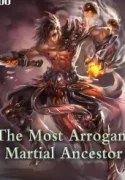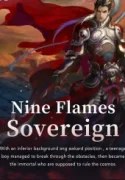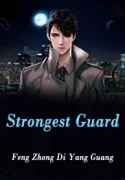Scholar's Advanced Technological System - Old Opponent
<!– –>
Old Opponent
Also, seeing someone in real life was completely different than seeing them through a camera.
Lu Zhou didn’t know why, but this student looked familiar.
However, he couldn’t remember where exactly he met this guy.
Wei Wen replied awkwardly, “We met during the interview… and the mathematical modeling competition.”
Of course they met during the interview.
As for the second part…
During the final stage of the competition, Wei Wen arrogantly walked up to Lu Zhou and said, “Your thesis wasn’t bad, but the championship is mine.”
In the end, Lu Zhou was the one that won the Higher Education Society Cup.
Since then, Wei Wen had been trying to catch up to Lu Zhou.
However, the difference between them only became bigger and bigger; Wei Wen couldn’t even see God Lu’s taillights.
When Wei Wen attended the conference at Beijing Normal University, he saw Lu Zhou winning the Shiing-Shen Chern Mathematics Award. Wei Wen wanted to jump off a bridge, but he still aimed to catch up to Lu Zhou.
However, even though Wei Wen set an unrealistic goal, he was still able to accomplish many achievements.
Wei Wen received his bachelor’s and an offer from Professor Lu at Princeton. He was a god among his peers and a “model child” among his family friends.
However, Wei Wen was still far from where he wanted to be.
It was actually his decision to choose Lu Zhou as his supervisor.
The reason was simple; Wei Wen wanted to improve.
Lu Zhou didn’t really know the personalities of his two students yet, so he didn’t assign them any work. He only gave them each a textbook and told them to write notes on it.
Fundamental studies would start from the textbooks. In order to find an interesting topic to conduct research on, one needed a comprehensive understanding of that field.
After that was more advanced studying.
To really dive into a certain topic, advanced studying would require reading theses and documents.
Even if someone used these theses as resources and made a millimeter of progress, it would still be worthy of a graduation thesis.
These two master’s students were still far from publishing any theses.
Right now, they had to build up their fundamental knowledge.
There was no shortcut.
By the time Lu Zhou got back, his office laboratory had returned to normal.
Even the energetic Hardy had calmed down and was quietly doing his research.
Time flew by.
Around six o’clock, some of the students left the office and went downstairs to eat.
There were only two people in the office.
Vera looked around the office.
She made sure that there was no one else in the office before she picked up the first draft of her thesis and walked to Lu Zhou’s desk.
Lu Zhou looked up at Vera and remembered her emails. He then placed down his pen and asked, “Do you plan on telling me about your discovery?”
Vera looked embarrassed as she handed out her thesis.
“… Please look at it for me.”
Lu Zhou took the thesis and flipped through the pages. After a while, he nodded his head.
Not bad.
Among his three students, Vera was the only one that had a true understanding of the Group Structure Method. She was the only one that could integrate it into her own research.
Not only that, but her thought process was similar to Lu Zhou’s.
Strictly speaking, the Collatz conjecture was an additive number theory problem, but it looked like a complex analysis problem as well. However, it wasn’t fully compatible with the Group Structure Method.
What Vera did was to convert the Group Structure Method to be compatible with all natural numbers instead of only using prime numbers.
Of course, this was no easy task. She only did a specific analysis of a specific problem, and the flaws in her work were obvious.
Lu Zhou looked at the thesis and drew two question marks on it. He then said, “I have a few questions.”
Vera said, “Please go ahead, Professor Lu.”
Lu Zhou: “13th line, fourth page. I noticed that you set the mapping K: →△ equals to πog = f, can you tell me what this part means?”
Vera looked at the thesis and explained: “K(x) is a bounded holomorphic function on the complex plane. Using Liu Wei’s theorem, we prove that Q(x) is the value function, then we can prove that equation (7) holds.”
“This step is fine.” Lu Zhou was impressed at Vera’s logical reasoning, and he said, “But on line 11, page seven, I noticed that you are using equations (7) and (8). Your conclusion was that each branch of D of Φ(g) containing a positive integer has z0∈D, but this step is wrong.”
Vera looked at the thesis for a while.
She was a little embarrassed, and she lowered her head.
“You’re right… I’ll rethink it.”
“Don’t be discouraged, your work was good,” Lu Zhou said. He continued, “If you solve the problems, this thesis would be an outstanding achievement.”
Vera bit her lip and shook her head; her blonde hair gently swayed.
“But I was still wrong.”
Lu Zhou looked at his student and thought for a moment before he said, “I have my first number theory class on Wednesday, you should come.”
Lu Zhou: “Although undergrad classes aren’t that useful for you, you’re still my assistant. You need to cover for me when I’m busy.”
Vera suddenly looked nervous, and she asked, “Do I have to lecture?”
“Of course, lecturing is part of being an assistant, I told you this before.”
Lu Zhou smiled and continued, “Also, occasionally thinking about obvious problems will be very helpful for your research. It might inspire you. When I was solving Goldbach’s conjecture, I was inspired by Fefferman’s number theory class even though his class had nothing to do with Goldbach’s conjecture.”
Vera opened her mouth and wanted to say something, but Lu Zhou patted her back and interrupted her.
“Relax, you already did the Berkeley report, so why are you still scared of a Princeton lecture?”
Vera blushed and lowered her head.
“Okay.”
…
Lu Zhou was jetlagged, and therefore, he wasn’t that hungry.
He asked Vera to bring a bacon sandwich for him. He then stopped working and started to sort through his mail.
He was gone for a month, and his drawer was filled with mail.
Most of them were contracts sent by White.
On the bottom of the pile of mail, Lu Zhou pulled out a surprisingly well-packaged letter.
He looked at the sender’s name and was stunned.
“American Chemistry Society?”
Lu Zhou opened the envelope.
“Dear, Professor Lu, I am the president of the American Chemical Society…”
Lu Zhou skipped the middle and read the last line.
From his experience, the important part of the letter was always at the bottom.
He was shocked.
<!–
<!– ( . ), Please let us know
<!–
–>









